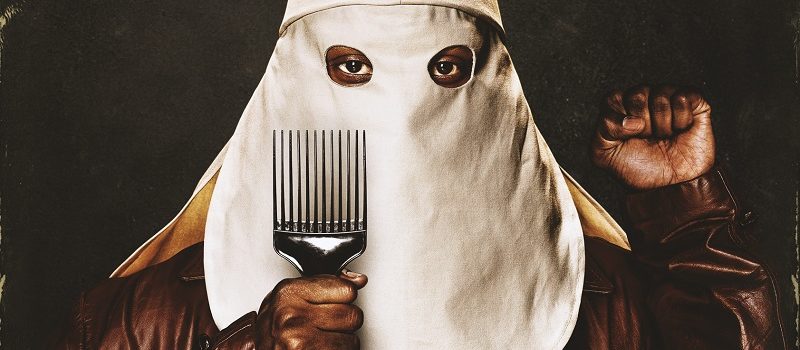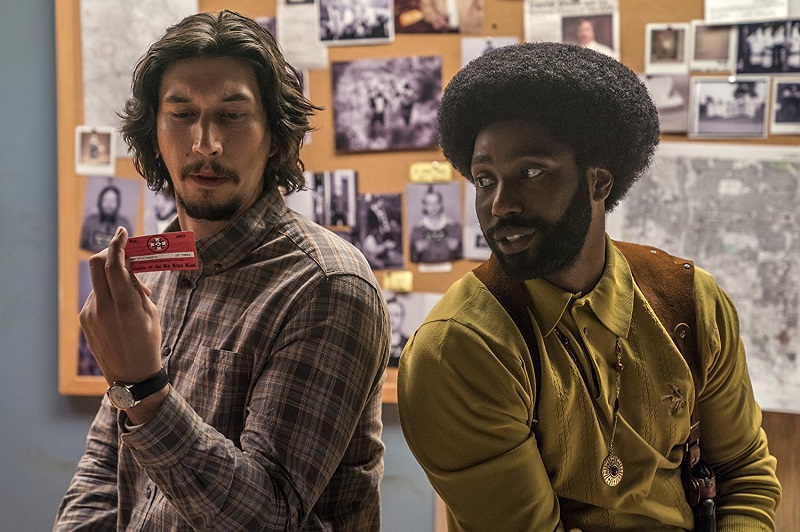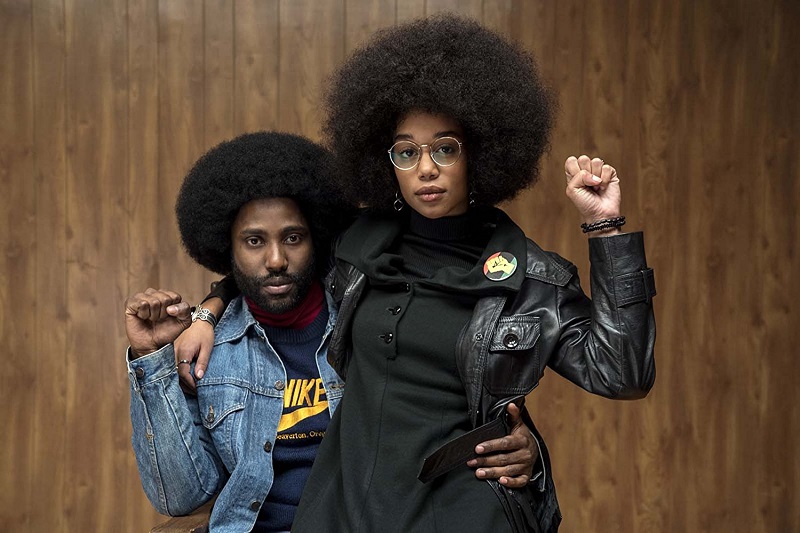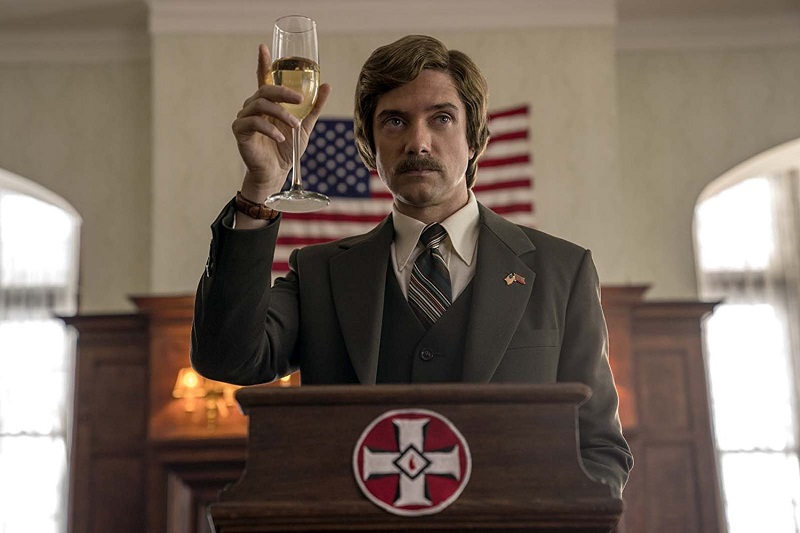When Spike Lee dials it to the max, there is nothing finer. That is certainly the case with his latest, BlackkKlansman. From Do the Right Thing to Malcolm X to Inside Man, the helmer finds a tenor that merges with his filmmaking DNA and audiences get a cinematic experience that reminds us why the medium is our favorite means of storytelling. He has done it again with his new flick and it strikes deep, is incendiary and sadly for a tale about race relations in the early 70s, is incredibly timely.
The true story chronicles how a black detective, Ron Stallworth (John David Washington), infiltrated the KKK in Colorado Springs, Colorado in 1972. Yes, you read that right. How, you may ask? Well, to quote Stallworth in the film, “with the right white man, you can do anything.” That soul arrives in the form of Stallworth’s partner, Flip Zimmerman (Adam Driver).
They will each play “Stallworth” in this undercover operation to show that the racist group is responding to burgeoning civil rights movement by readying to launch a violent attack. Ron will work the phones and Flip will serve as the in-person, on the ground, face of the operation. Each impeccably plays the part and the entire endeavor would never have worked without both partner’s pitch-perfect performance. In fact, Ron managed to work a relationship all the way to the top of the KKK, Grand Wizard David Duke.
Lee’s filmmaking is crisp, cutting and delivers an emotive power that is stunning (he also co-wrote the work). The way he uses his craft in the most creative of ways is extraordinary in BlackkKlansman. He is a man on a mission and all of that pays off handsomely throughout, but especially in the film’s final minutes. The viewer realizes exactly where he is going and his “point” to the entire exercise.
First off, it’s an incredible story that needs to be told and is often the case with tales like this from decades prior, it is surprising that it hasn’t seen the silver screen light of day before now. But, fate works in funny ways. Perhaps it was simply the story needed the right storytelling, armed with the right leading man.
An impeccable example of Lee working his trademark movie magic excellence is a scene where a former Black Panther leader is in town to address the black student union. Kwame Ture (Corey Hawkins) is speaking to a crowded house that includes Ron. He is there, supposedly undercover, to access the sentiment of the room and if any of it could lead to violence. The way that Lee interjects the powerful prose of what Ture electrically delivers with his enraptured audience is beyond brilliant. Lee lights members of the crowd as individual souls, each having their own, almost spiritual reaction to the words that are electrifying the room—and also us the audience.
Washington is a revelation. The son of Denzel has been working his way up the ladder. With his first true headlining role, Washington has announced the world that he is a force of nature. The way he manages to thread that needle between portraying the two “characters” is sublime. The actor has to be one element as an undercover officer and then turn on a dime to be “himself,” as he romances a black student union president, Patrice Dumas (Laura Harrier). One can palpably sense his conflict.
He is trying to make change for his people from the inside, something Patrice does not believe is possible with an American institutional racism system that dates back centuries. How the two thespians intertwine is one of the great gifts of BlackkKlansman. Patrice awakes something in Ron socially, politically and esoterically. Meanwhile, Ron affects her in the same manner. Whereas she once saw cops as so-called “pigs,” Patrice eventually learns from Ron that perhaps he is right. Change can (and must) come from all sides and not a single one should be eliminated from the effort to alter the course of history.
It is so handled with such grace, and is mesmerizing.
Driver delivers yet again. The actor firmly knows his supporting role in this effort, although he may screen time-wise, may be right up there with Washington. He too has a complex web to weave as a Jewish police officer who has spent his life, essentially not being Jewish. Flip was never Bar Mitzvahed. Yet, it is his experience infiltrating the KKK as Ron, with Ron, that opens his own religious eyes to the rituals, legacy and life of what it means to be a Jew that he has been missing—even if he had never realized it prior.
Also stunning is the performance turned in by Topher Grace as Duke. He manages to not only capture the cadence and tone of the KKK leader, but also the ingrained philosophical tenants of what he believes in and how his sentiments have permeated a segment of white society that have their fires fanned by his divisive and racist rhetoric.
When a film works its story arc over almost two hours and each soul we witness is altered by the experience, it is truly a bonafide blessing. That is another gift of BlackkKlansman. Nobody comes out unscathed and that is how it should be with a film of such importance. Consider yourself warned that a visceral reaction is to be expected and you will thank the movie G-ds that you are better for it.
I would be neglectful if a spotlight wasn’t also placed Lee’s stunning choice of songs for his soundtrack intertwined with the score by Terence Blanchard. From Oh Happy Days by The Edwin Hawkins Singers, to the use of Cornelius Brothers and Sister Rose’s Too Late to Turn Back Now in the most delightful, life and love-affirming scene and even the decision to use Emerson, Lake and Powell’s Lucky Man in a moving and pivotal scene—Lee’s sonic choices are beyond beautiful and emotively exquisite.
What makes BlackkKlansman so timely and terrifying is several things. In one scene, a white superior officer—Sergeant Trapp (Ken Garito)—is talking about Duke and his aspirations for elected office to spread his brand of hate as a legitimate political movement. Stallworth laughs it off, even when it is suggested that America could one day elect a racist to the White House. After his subordinate concludes his chuckle, Trapp calls his African-American friend naïve. It cuts right through the heart. Without saying too much, let’s just say Lee closes his film with five minutes of footage that emphasizes the point that this is a period piece, yes, but it is just as much a story of today as anything else.
Grade: A+




